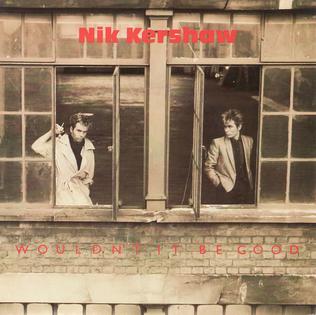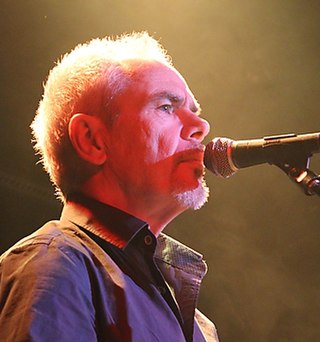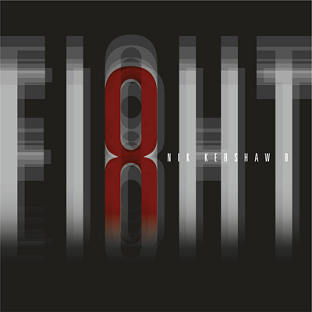Progress is advancement to a higher or more developed state.

Nicholas David Kershaw is an English singer, songwriter, musician and record producer.

The Works is the fourth studio album by the English singer-songwriter and multi-instrumentalist Nik Kershaw. It was released in 1989 and was the last album he created for MCA Records. Kershaw chose the album's title as he felt the album represented "the collected works of Nik Kershaw". He did not release any new solo material until 15 Minutes, 10 years later.

Human Racing is the debut studio album by the English singer-songwriter Nik Kershaw, released on 27 February 1984 by MCA Records. Several songs like "Drum Talk" were based around improvisation; other songs, like "I Won't Let the Sun Go Down on Me", had a political message.

Radio Musicola is the third studio album by the English singer-songwriter Nik Kershaw, released on 24 October 1986 by MCA Records, just under two years after Kershaw's previous studio album, The Riddle (1984). It was the first studio album to be produced by Kershaw. It features guest backing vocalists, including Icehouse's Iva Davies, and Night's Stevie Lange, and Miriam Stockley.

15 Minutes is the fifth studio album by English singer-songwriter Nik Kershaw, released on 6 April 1999.

The Riddle is the second studio album by English singer-songwriter Nik Kershaw, released on 19 November 1984 by MCA Records.

You've Got to Laugh is the seventh studio album by Nik Kershaw, released on 26 October 2006 under his own record label. Initially, the album was only available for purchase online via his web site through his own studio, Shorthouse Records. The album is currently available for digital download via iTunes or eMusic, as well as other music streaming services such as Spotify.

"Wouldn't It Be Good" is a song by the English singer-songwriter Nik Kershaw, released on 20 January 1984 as the second single from his debut studio album, Human Racing (1984). The release was Kershaw's second single, with the non-album track "Monkey Business" as its B-side; it was a bonus track on the 2012 re-release of the album. The music video was directed by Storm Thorgerson.

Nobody Knows is a song by the English singer-songwriter Nik Kershaw. It was released as the lead single from his third studio album Radio Musicola (1986). The release was Kershaw's tenth single, and features the non-album track, "One of Our Fruit Machines Is Missing" as its B-side.

"I Won't Let the Sun Go Down on Me" is a song by English singer-songwriter Nik Kershaw from his debut studio album, Human Racing (1984). It was his first single, released on 9 September 1983 to limited success. When re-released on 4 June 1984, the song became Kershaw's highest-charting single on the UK Singles Chart, peaking at number two. It features the non-album track "Dark Glasses" as the B-side, which was also released as a bonus track on the 2012 re-release of the album.

"Human Racing" is a song by the English singer-songwriter Nik Kershaw. It was the title track for his hit debut studio album of the same name, released in September 1984. It was the fourth hit single from the album, reaching No. 19 in the UK Singles Chart. It entered the chart in the week ending 15 September 1984, and remained within for seven weeks. An earlier version of the song, titled "Look Behind You", appeared on the studio album Till I Hear from You (1980) by Fusion, a band with Kershaw on lead vocals and guitar.

"When a Heart Beats" is a song by English singer-songwriter Nik Kershaw, released as the lead single from his third studio album, Radio Musicola (1986)—although the song does not appear on the LP version of the album, only on the cassette and CD editions. Kershaw's eighth single overall, it features the track "Wild Horses"—which was originally included on his previous studio album, The Riddle (1984)—as its B-side.

"The Riddle" is a song by the English singer-songwriter Nik Kershaw, released in 1984 as the lead single from his second studio album of the same name. Kershaw described the lyrical content as being nondescript to fill as a "guide vocal" for the production. It reached number three on the UK Singles Chart and peaked within the top 10 in countries like Ireland, Norway, Sweden, Australia and New Zealand. An accompanying music video was made for the song and features references to Lewis Carroll's book Alice's Adventures in Wonderland (1865).

The discography of Nik Kershaw consists of nine studio albums, three live albums, eight compilation albums, one extended play (EP) and 27 singles. His 62 weeks on the UK Singles Chart between 1984 and 1985 beat all other solo artists.

No Frills is the eighth album by Nik Kershaw, recorded live at his own Shorthouse Studios and released on 1 February 2010 under his own record label. Initially, the album was only available for purchase online via Kershaw's web site through his own indie vanity label, Shorthouse Records.

"Elisabeth's Eyes" is a song by English musician Nik Kershaw, released in 1989 as the second and final single from his fourth studio album, The Works (1989). It was written by Kershaw, and produced by Kershaw and Julian Mendelsohn.

"Dancing Girls" is a song by the English singer-songwriter Nik Kershaw. It was the third single from his debut studio album, Human Racing, and released on 2 April 1984. It charted on 14 April 1984, and reaching a peak position of No. 13 in the UK Singles Chart. It stayed on the charts for nine weeks.

Ei8ht is the eighth studio album by Nik Kershaw, released on his independent label Shorthouse Records in 2012. The album reached No. 91 on the UK Albums Chart and No. 12 on the UK Independent Albums Chart.

Oxymoron is the ninth and most recent album by British singer-songwriter Nik Kershaw, released on 16 October 2020. The album was recorded at Abbey Road Studios.


















